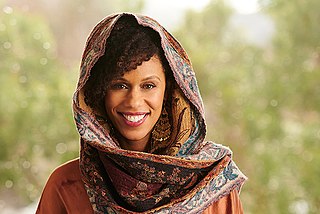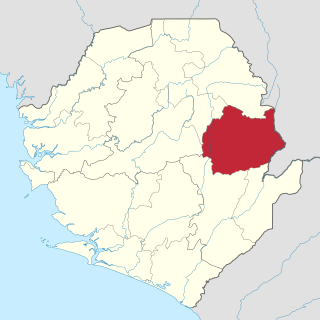
The government of Sierra Leone is the governing authority of the Republic of Sierra Leone, as established by the Sierra Leone Constitution. The Sierra Leone government is divided into three branches: the executive, legislative and the judiciary. The seat of government of Sierra Leone is in the capital Freetown.

The Mende are one of the two largest ethnic groups in Sierra Leone; their neighbours, the Temne people, constitute the largest ethnic group at 35.5% of the total population, which is slightly larger than the Mende at 31.2%. The Mende are predominantly found in the Southern Province and the Eastern Province. The Mende are mostly farmers and hunters. Some of the major cities with significant Mende populations include Bo, Kenema, Kailahun, and Moyamba.

The Poro, or Purrah or Purroh, is a men's secret society in Sierra Leone, Liberia, Guinea, and the Ivory Coast, introduced by the Mane people. It is sometimes referred to as a hunting society and only males are admitted to its ranks. The female counterpart of the Poro society is the Sande society.

Julius Maada Wonie Bio is a Sierra Leonean politician, and the current president of Sierra Leone since 4 April 2018. He is a retired brigadier in the Sierra Leone Army and was the military head of state of Sierra Leone from 16 January 1996 to 29 March 1996, in a military junta government known as the National Provisional Ruling Council (NPRC).

Sande, also known as zadεgi, bundu, bundo and bondo, is a women's initiation society in Liberia, Sierra Leone, Guinea and the Ivory Coast. The Sande society initiates girls into adulthood by rituals including female genital mutilation. It is said by its supporters to confer fertility, to instill notions of morality and proper sexual comportment, and to maintain an interest in the well-being of its members throughout their lives.

A tribal chief, chieftain, or headman is the leader of a tribal society or chiefdom.

Princess Sarah Jane Culberson, Lady of Bumpe is an American philanthropist, public speaker, educator, writer and actress. By birth she is a Mende princess of the Bumpe–Gao Chiefdom in Sierra Leone.

Kono District is a district in the Eastern Province of Sierra Leone. Its capital and largest city is Koidu Town. Motema is the second most populous city in the district. The other major towns in the district include Yengema, Tombodu, Jaiama Nimikor and Sewafe. The district is the largest diamond producer in Sierra Leone. The population of Kono District is 505,767. Kono District borders Kenema District to the southwest, The Republic of Guinea to the east, Koinadugu District to the northeast and Kailahun District to the southeast. Kono District is divided into fourteen chiefdoms.
Sierra Leone Progressive Independence Movement was a political party in Sierra Leone, led by Paramount Chief from Kono, Tamba Sungu Mbriwa. The party was founded in 1958, through the merger of the Kono Progressive Movement and the Sierra Leone Independence Movement. The objective of the party was, according to its founding declaration, to "prosecute more vigorously a political campaign for national unity and independence."
Thomas Corker was known as an English agent for the Royal African Company on York Island. He married a Sherbro woman and had two sons with her before his early death.
The Kono people are a major Mande-speaking ethnic group in Sierra Leone at 5.2% of the country's total population. Their homeland is the diamond-rich Kono District in eastern Sierra Leone. The Kono are primarily diamond miners and farmers.

Paramount Chief Ella Koblo Gulama OBE, GCOR was a Sierra Leonean paramount chief and politician. In 1957, she became the first elected female Member of Parliament in Sierra Leone. She was re-elected in 1962. During the government of Milton Margai, Gulama became Sierra Leone and sub-Saharan Africa's first female Cabinet Minister.
Tamba Songu M'briwa was a prominent Sierra Leonean politician and paramount chief from the Kono ethnic group, who formed one of the few political parties in Sierra Leone before independence.
Julius Momoh Gulama was a Sierra Leonean King, statesman and educator in the preindependence era. As King of Kaiyamba Chiefdom, he ruled the largest and most powerful Mende chiefdom in the Sierra Leone.
Momoh Gulama was a Sierra Leonean paramount chief who ruled Kaiyamba Chiefdom in Moyamba District.

Bai Koblo Pathbana II, was a paramount chief and politician in Lunsar, Port Loko District, Sierra Leone. He was crowned the 43rd Paramount Chief of Marampa-Masimera Chiefdom in 1943.

Bernadette Lahai, CRSL is a Sierra Leonean politician and the current Minority Leader of Parliament of Sierra Leone. She is the leader of the main opposition Sierra Leone People's Party (SLPP) in the Sierra Leone House of Parliament. She currently represent Constituency 13 from Kenema District in the Sierra Leone House of Parliament.
Haja Umu Hawa Tejan-Jalloh, GCOR is a Sierra Leonean lawyer who was the first female Chief Justice of Sierra Leone from 2008 to 2015.

Sierra Leone, officially the Republic of Sierra Leone, is a Constitutional Republic in West Africa. Since it was founded in 1792, the women in Sierra Leone have been a major influence in the political and economic development of the nation.
Matilda Yayu Lansana Minah is Paramount Chief of the Pujehun District in Sierra Leone. She became chief in 1985 after the death of her father, and was elected to parliament in 2018. She is outspoken on women's rights, agriculture and education.








